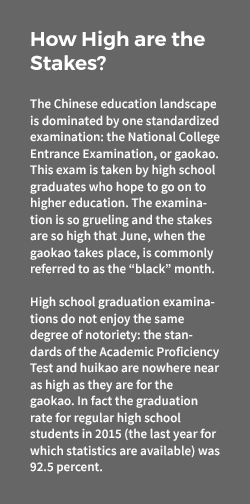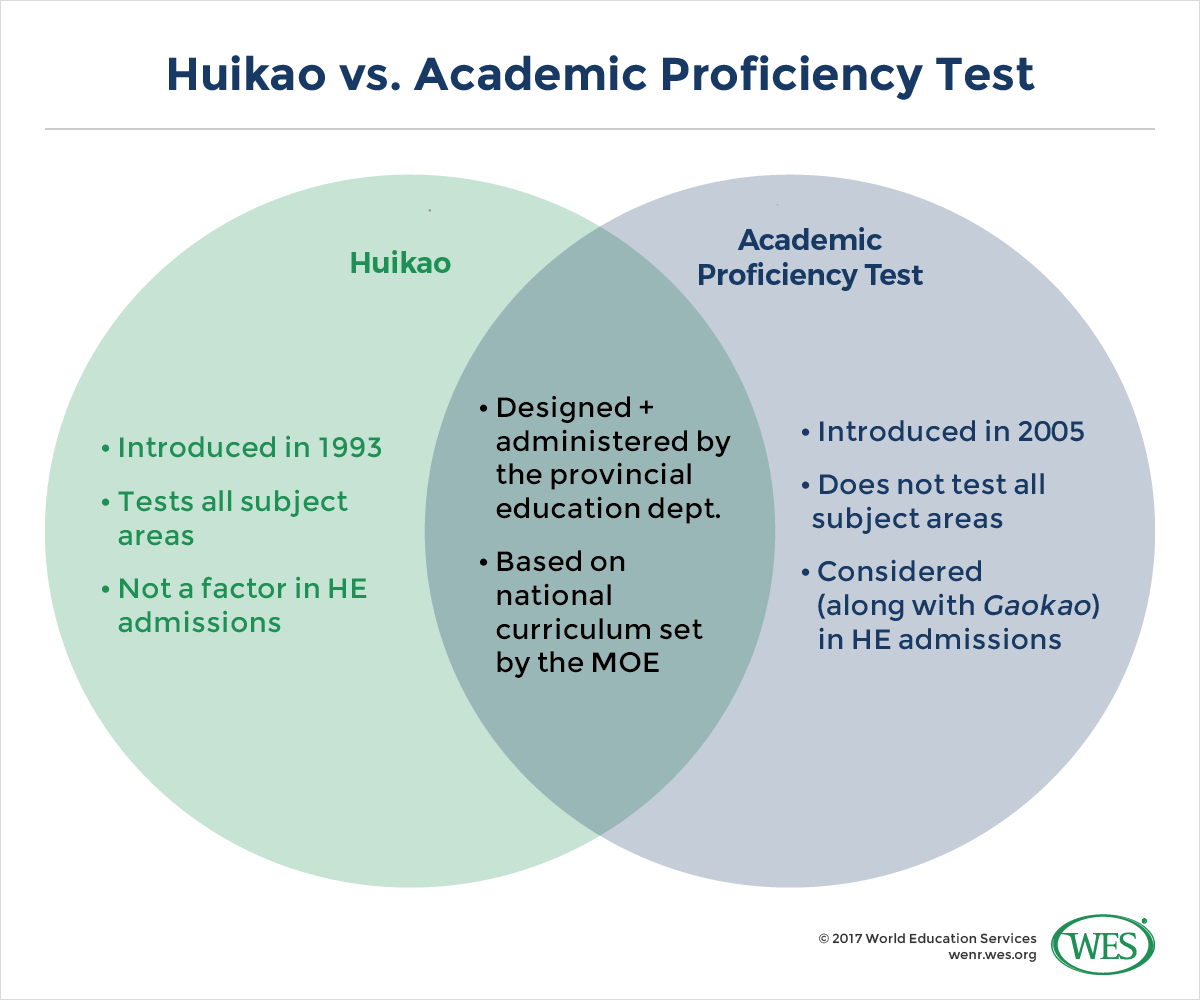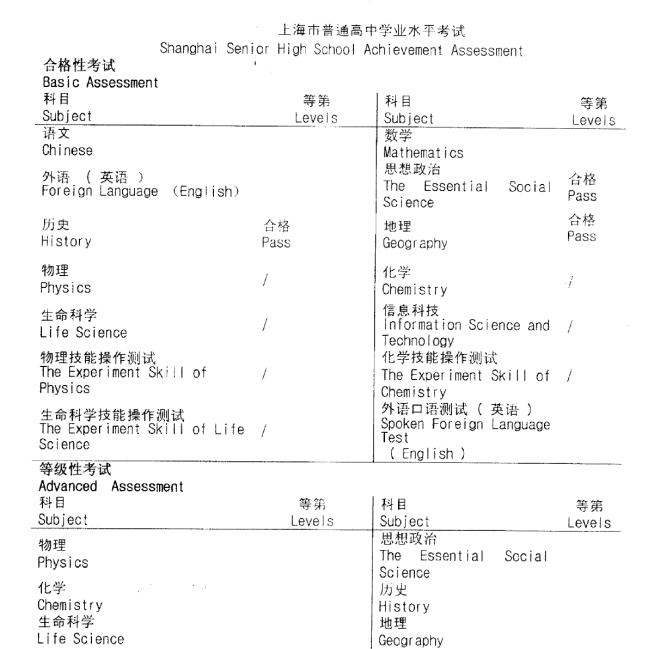Rachel Michael, Knowledge Analyst, WES
 [2]China’s most famous standardized exam, the gaokao [3], governs Chinese students’ access to higher education. It is highly competitive and notoriously difficult. But what of other national exams?
[2]China’s most famous standardized exam, the gaokao [3], governs Chinese students’ access to higher education. It is highly competitive and notoriously difficult. But what of other national exams?
Two of the most important from a credential evaluation perspective include the General Graduation Examination (huikao) and the Academic Proficiency test (xueye shuiping ceshi). To graduate from high school, Chinese students must generally and depending on where they live, pass one or the other.[1]There are some exceptions to this rule. For instance, in Hubei province, there is no high school graduation examination, and international schools may offer alternative examinations such as the International Baccalaureate or GCE A-levels.
This article examines differences between these two capstone examinations, as well as variations that are particular to Shanghai, China’s biggest city.
Huikao vs. Academic Proficiency Test
The term huikao is sometimes used as a generic name for both types of high school graduation examination in China, but in fact there are important differences between the two tests.
- The huikao, which was introduced in 1993, tests all subject areas of the curriculum and is not a factor in higher education admissions.
- The Academic Proficiency Test was introduced in Jiangsu province in 2005, and has been adopted by several other jurisdictions since then. In contrast to the huikao, it tests a smaller number of subjects and has, in accordance with reforms passed in 2014, been incorporated into higher education admissions alongside the gaokao.
Both the huikao and the Academic Proficiency Test are based on the national curriculum set by the Ministry of Education in Beijing. However, the graduation exams are designed and administered by provincial or municipal education departments across China. The exact format and content of the examinations therefore vary. Whether a pupil takes the huikao or the Academic Proficiency Test depends on the jurisdiction in which they have their hukou, or permanent registration.
Pupils can take each subject examination starting in the second semester of Grade 10, after they have completed the required credits in that subject.
Despite the high level of centralization and relative homogeneity of China’s secondary education system, the regional variations can be significant. Changes to Shanghai’s Academic Proficiency Test, starting in 2016, are a notable example.
The Hukou System and Education Access
The type of test that students take is governed in part by China’s household registration system, known as huji or hukou. The system has been used to control internal migration in China since the 1950s. It does so by governing access to services, including education, based on the holder’s place of permanent residence.
The hukou’s significance when it comes to secondary education can hardly be overstated. For one, pupils must take the high school graduation examination in the place of their permanent registration. Moreover, the registration system’s reach extends beyond secondary education: It also determines how likely high school graduates are to be accepted to a top-tier university. This is partly because the most prestigious institutions, which are disproportionately located in the wealthiest cities, reserve a disproportionate number of places for students with local registration. [2]For an in-depth discussion of the hukou in the context of urbanization, see Koen, V. et al. (2013), “Policies for Inclusive Urbanisation in China”, OECD Economics Department Working Papers, No. 1090, OECD Publishing, Paris. http://dx.doi.org/10.1787/5k3xz6hc2z0x-en
Shanghai’s New Academic Proficiency Test Format: Basic (qualified) and Advanced (graded)
Shanghai is one of four Chinese municipalities directly under the central government. As such, it has the same administrative status as a province – and this includes a degree of control over high school graduation requirements. The changes that Shanghai has introduced to its Academic Proficiency Test are significant.
In other parts of the country, the examination consists of just one level, whereas the Academic Proficiency Test in Shanghai is divided into two, the basic level (also known as hege, or qualified) and the advanced level (also known as dengji, or graded) examinations.
- The basic examination is a requirement for a Shanghai Department of Education-issued high school diploma.
- The advanced examination, by contrast, is not a prerequisite for a high school diploma, but it is a requirement for Shanghai high school graduates who plan to apply to Chinese universities. This is because the results of the advanced examination are factored into higher education admissions along with the gaokao
Examination Timing
The individual subject tests that make up the basic and advanced examinations are spread out over the course of the three years of senior high school. (These subjects are discussed in greater detail below.) For the basic examinations, all subject tests, except for Chinese, Mathematics and Foreign Language, can be taken in Grade 10 and Grade 11 or, at the very latest, in Grade 12. The three core subjects are examined during the first semester of Grade 12.
Those who choose to take the advanced examination take the individual subject tests at the Advanced level during Grade 11 and Grade 12.
The Basic Examination
Grading for the basic examination is Pass (or Qualified) / Fail (or Not Qualified), and each subject test can be retaken once.
The following subjects are examined only at the basic level: Chinese, Mathematics, Foreign Language (this is usually English), Information Technology, Physical Education, Labor Technology, and Art.
Chinese, Mathematics, and Foreign Language are tested in 90-minute written examinations. There is also a 30-minute listening-comprehension test for Foreign Language. Information Technology is a computer-based examination lasting 60 minutes.
Physical Education, Labor Technology, and Art are not subject to a written or standardized test. Instead, these subjects are assessed by the high school attended. If a student’s performance is considered to meet the curriculum standards, a Pass grade is awarded.
NOTE: Political Science, History, Geography, Physics, Chemistry, and Life Sciences are examined at both the basic and advanced levels. At the basic level, these subjects are examined in the form of 60-minute written examinations. Physics, Chemistry, and Life Sciences are also tested in 15-minute practical examinations.
The Advanced Examination
To be eligible to sit for the advanced examination, candidates registered in Shanghai must have passed the basic examination, and candidates registered in other parts of the country must have passed their region’s huikao examination.
Shanghai high school graduates who want to retake the gaokao because they are dissatisfied with their performance the previous year must also take the advanced examination. Under no circumstances can the electives be changed once they have been chosen, and the individual subject tests cannot be retaken.
At the advanced level, students can choose to be examined in three of the following six subjects, which take the form of 60-minute written tests: Political Science, History, Geography, Physics, Chemistry, and Life Sciences. Grading is on a curve from A+ to E and the grades are valid for two years.
References
| ↑1 | There are some exceptions to this rule. For instance, in Hubei province, there is no high school graduation examination, and international schools may offer alternative examinations such as the International Baccalaureate or GCE A-levels. |
|---|---|
| ↑2 | For an in-depth discussion of the hukou in the context of urbanization, see Koen, V. et al. (2013), “Policies for Inclusive Urbanisation in China”, OECD Economics Department Working Papers, No. 1090, OECD Publishing, Paris. http://dx.doi.org/10.1787/5k3xz6hc2z0x-en |


